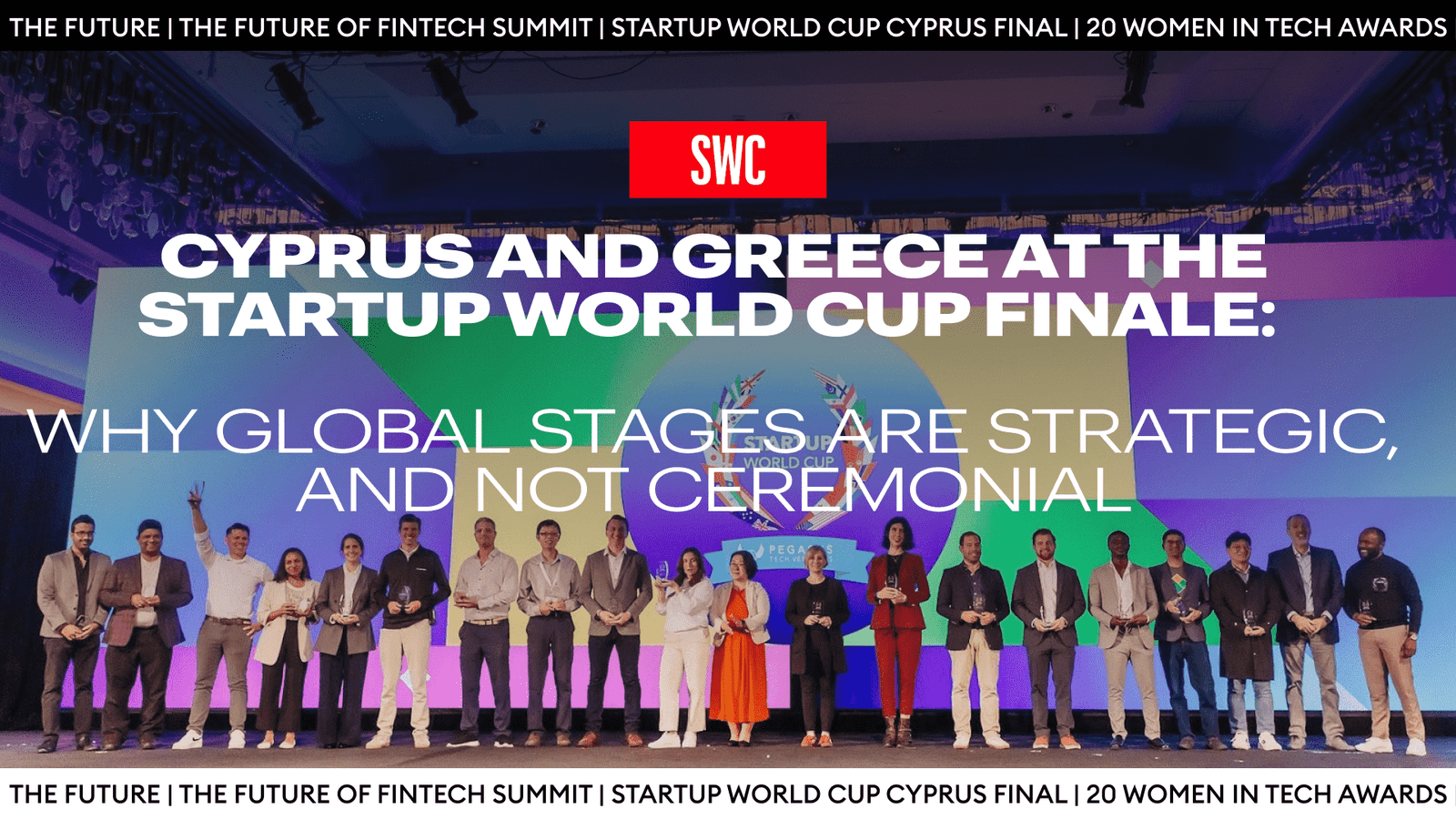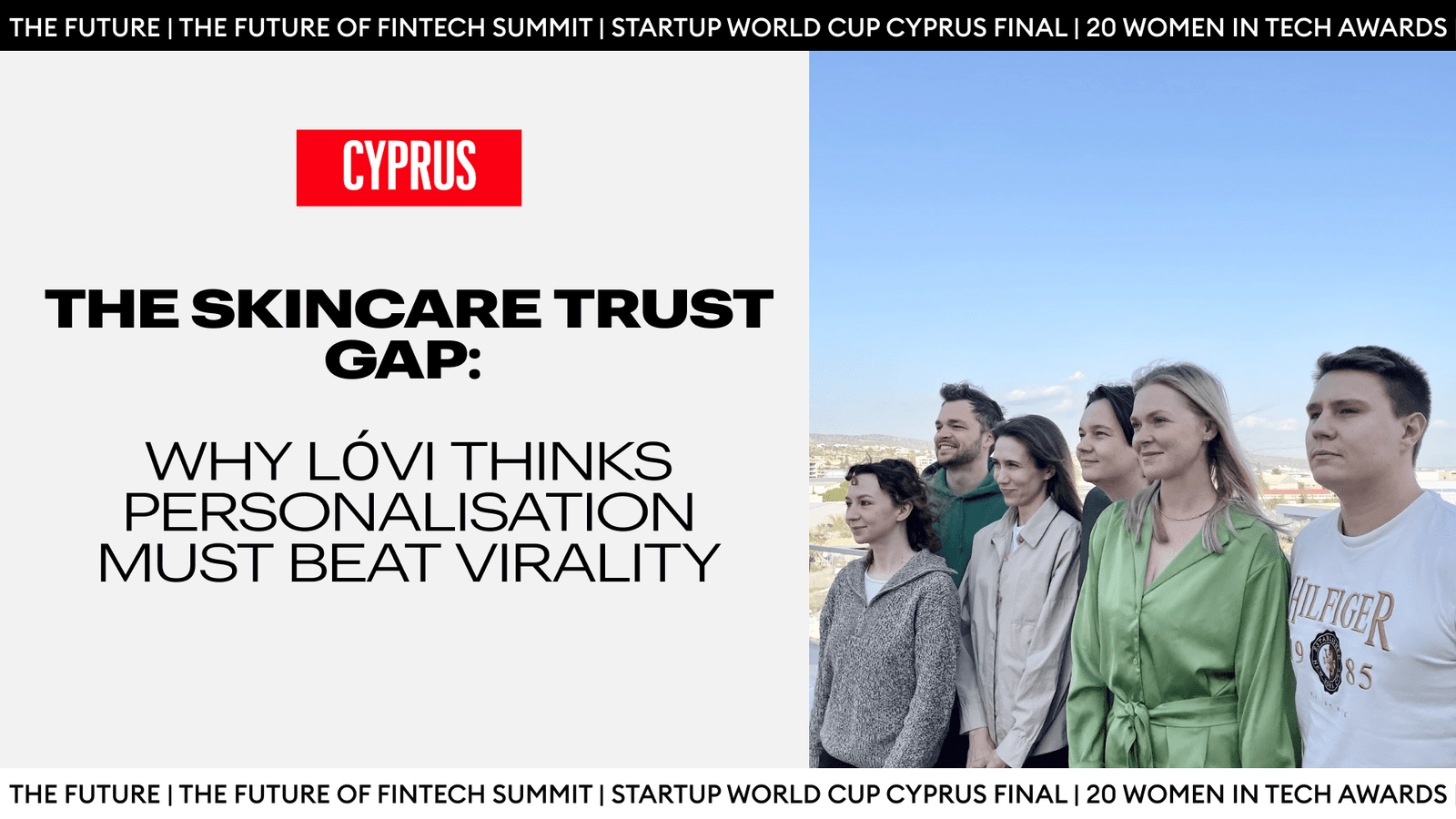In mid-October of this year, San Francisco hosted the Startup World Cup Grand Finale. This annual gathering brought together 98 national champions from more than 80 countries, all competing for a $1 million investment and a spotlight in the world’s most influential startup ecosystem. Organized by Pegasus Tech Ventures, whose portfolio includes SpaceX and Airbnb, the event has become a critical launchpad for emerging startups seeking global traction.
This year, for the first time, Greece sent an entry to the final round, the winner of their regional finale, Grandmama. Cyprus returned for the second consecutive year with their entry, Calspak.
Follow THE FUTURE on LinkedIn, Facebook, Instagram, X and Telegram
Calspak and Grandmama didn’t go to San Francisco just for a trophy. They went to test their ideas against the world’s best, meet investors who rarely look south of Berlin because proving you belong in Silicon is often the fastest way to convince everyone back home that you do.
The Numbers Behind the Moment
Cyprus ranks 25th in the Global Innovation Index 2025, ahead of the UAE and just behind Israel in its region. It places 11th worldwide in creative outputs, a testament to its research density and IP generation. Yet its market sophistication pillar sits in the mid-thirties, and indicators like gross R&D expenditure still rank in the fifties, highlighting the gap between scientific output and the actual state of domestic markets and investment capacity.
According to the Global Innovation Index 2025, Cyprus scores extremely well in venture capital co-participation and deal count per GDP, ranking first and sixth, respectively. At the same time, the composite indicator Finance for startups and scaleups ranks seventy-third. Early-stage teams still find it difficult to secure local risk capital.
In 2025, Cypriot startups raised $77 million across 13 verified equity rounds. Only three involved local investors. The rest came almost entirely from foreign funds, with most of the money originating in larger hubs such as the UK, continental Europe, and the US.
Greece, meanwhile, has made steady progress. Its startup ecosystem is now valued at $4.2 billion, with Athens ranked among the top 100 emerging tech hubs globally. Funding reached €555 million in 2024, though a large share of capital is still concentrated in a small group of later-stage teams.
Both Cyprus’s and Greece’s activity is extremely slow and small next to the giants: the U.S. alone accounts for 46.6% of global startup activity, per StartupBlink’s 2025 data. China, the U.K., and India together make up another 20%.
Showing up in San Francisco, therefore, is not just a story about two companies travelling across the ocean. It’s about setting a new path of access for small market players to enter big opportunities.
What San Francisco Delivered
For Calspark, Cyprus’s Startup World Cup finalist, the week in San Francisco was eye-opening to the difference in approach to investment between Europe and the United States.
“Competing alongside 97 other startups and witnessing 98 pitches from visionary founders around the world was incredibly inspiring. Experiencing the U.S. approach to investment—more risk-tolerant, faster-moving—will influence our trajectory.”
Calspak’s technology reengineers cement to cut emissions by up to 40% while hardening concrete in 4–6 hours instead of 12, a game-changer for precast manufacturers whose revenue depends on how many cycles they can run in a day. But selling into a conservative, risk-averse industry requires more than lab data. It needs validation. The Grand Finale offered exactly that.
Grandmama, Greece’s first-ever Startup World Cup finalist, discovered something deeper.
“I realized the challenges we’re solving—aging populations, caregiver shortages, lack of trust in homecare—are universal,” said founder Vicky Klimi. “That motivated me even more to scale internationally.”
Her platform connects families with more than 11,500 vetted caregivers and nurses, building what the team describes as a full-stack care infrastructure. In a country where 22% of the population is over 65, the local need is hands down urgent. But in San Francisco, she saw a global market and global partners.
Beyond One-Off Wins: Building Repeatable Pathways
What’s changed is that these appearances are no longer exceptions or one-offs.
Cyprus has now sent a startup to the Grand Finale two years running. Greece launched its first national qualifier in Athens in September, drawing 57 applications in 12 days. The event, hosted at SuiHub, put eleven startups on stage across artificial intelligence, biotech, energy, mobility, Web3, and maritime technology, with Grandmama emerging as the winner..
“This isn’t just a competition,” said Dmitry Dosov, General Partner at Aivitam Ventures and regional ambassador for the Startup World Cup. “We’re building infrastructure—a launchpad that turns local talent into global contenders.”
That infrastructure is invaluable. In Greece, state-backed tools like HDBI and EquiFund have seeded over 30 venture funds, creating the first real domestic VC layer. Cyprus still lacks a comparable mechanism, leaving founders reliant on Crowdbase, angel networks, and offshore funds.
Global stages like the Startup World Cup fill that gap temporarily, but they also expose the longer-term need: local capital that can move fast and think long-term.
Why Visibility Equals Opportunity
For investors scanning for the next breakout, ecosystems like Cyprus and Greece suffer from low signal. Public databases mix operating startups with holding companies. Many early-stage rounds get little circulation or even public announcement. The result? Many assume little is happening.
Events like the Startup World Cup make a bang where it is needed. Finalists have already been vetted by local juries that include Metavallon, Apeiron VC, Startup Greece, and others. For a Silicon Valley fund scanning dozens of emerging markets, a Startup World Cup finalist is a pre-vetted opportunity, supported by local experts who’ve already stress-tested the team and tech.
The impact runs deeper than a free ticket to the US. When a young founder in Thessaloniki or Paphos sees Grandmama or Calspak on stage in San Francisco, they don’t just see a pitch; they see proof that their geography isn’t a barrier. It’s an opportunity.
That image may be the seed that will one day grow the country’s next unicorns.
What Comes Next
Calspak is now running pilots in Switzerland, targeting the precast market before expanding into ready-mix concrete across Europe. “Our immediate focus is on scaling our pilot programs and expanding collaborations with strategic partners who share our vision for a more sustainable materials future.”
Grandmama is exploring partnerships in Southern Europe and the U.S., where home-care demand is surging.
Neither won the $1 million prize. Coreshell, a U.S. battery materials startup, took the top honor. But both returned with something equally valuable: credibility, connections, and clarity.
As Cyprus and Greece deepen their innovation pipelines, global events won’t be the destination, but perceived as moments to test, learn, and recalibrate.
And with ecosystems growing faster than their funding, those checkpoints may be the best bridge to what comes next.














